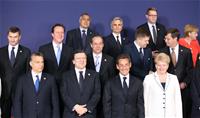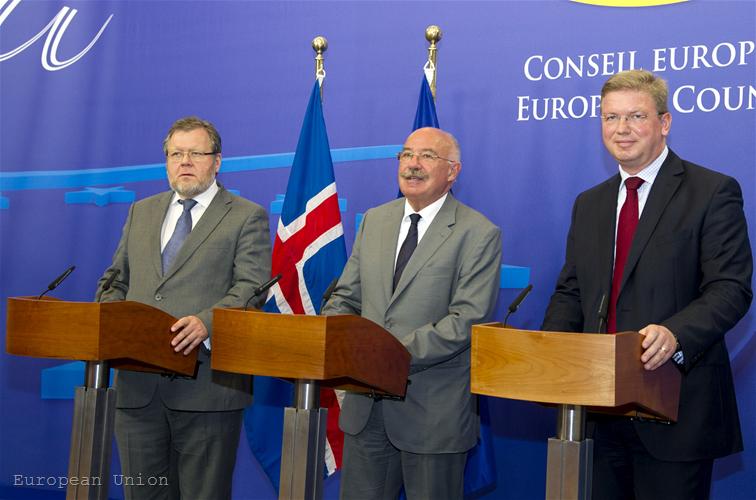Bulgaria is not worried that its budget will be peer reviewed
Adelina Marini, June 21, 2010
 "No, I am not because, I repeat - currently we have one of the smallest fiscal deficits. When all European countries reach our level of deficit, then it will not be politically difficult to do the necessary cuts, reductions of pensions, if necessary or of social aid, because everyone in Europe will do that". This is what the Bulgarian Prime Minister Boyko Borissov responded to an euinside question whether he was worried that Brussels will "peer review" the budgetary plans before they had been filed in national parliaments.
"No, I am not because, I repeat - currently we have one of the smallest fiscal deficits. When all European countries reach our level of deficit, then it will not be politically difficult to do the necessary cuts, reductions of pensions, if necessary or of social aid, because everyone in Europe will do that". This is what the Bulgarian Prime Minister Boyko Borissov responded to an euinside question whether he was worried that Brussels will "peer review" the budgetary plans before they had been filed in national parliaments.
The idea of a "European semester" has been launched by the European Commission in order to try and control the wave of problems, caused by excessive budgetary deficits and public debt which put under a serious threat the very existence of the eurozone. And as later it became clear, this threat spread to include the entire European Union, not only the countries with common currency.
After tough negotiations on Thursday EU leaders managed after all to reach an agreement on this issue and there will be a "European semester". The exact wording is as follows: "from 2011 onwards, in the context of a "European semester", presenting to the Commission in the spring Stability and Convergence Programmes for the upcoming years, taking account of national budgetary procedures". The sentence is complex because it reflects the consensus that has been reached at the summit (more on the summit later on euinside). But it clearly shows that although it will watch over without having the right to intervene, the European Commission will have the right to see which countries what budgetary plans have.
According to Mr Borissov, the idea actually is very good because "if we want to be competitive to the US, China, Russia and the big economic players in the world, this is the only chance - for us to have a powerful, common, economic, European, financial policy".
He added that all of us (EU countries) should be responsible to each other. These words sound too good to be true, especially against the backdrop of what the Bulgarian government is doing exactly in the budgetary field. The saga surrounding the update of Budget 2010 is a proof of the lack of thought that could go beyond Bulgarian dimensions and the borders of personal ratings.
It is always interesting to try and look at what's happening at EU summits through the eyes of a prime minister of a state whose place in the Union is disputable in so many aspects (excluding the geopolitical one). From a country where the book "Bay Ganyo" is written the view toward such a format of a gathering, where so many important issues are being discussed like striking a balance between the wishes of well developed and advanced countries and the weak ones, suffering from a chronic shortage not only of money but of political and any other capacity, gives a lot of material to think about.
For example the approach of the ruling party in our country is odd, at such summits, given the availability of a Bulgarian national press briefing room, the meeting with journalists usually takes place at the entrance between the press centre and the main Justus Lipsius building - where the current is terrible and the movement of people is significant. Against the background of watching the football games security people, of leaving delegations, of moving here and there journalists, of the noise of service hand carts, it is not quite convenient to stand before your prime minister and ask him how the summit went on.
And he, on his part, to talk as if with bifurcation of his position - on the one hand  there is some kind of distance in his words - as if he does not recognize himself as a part of EU leaders on the table, and in another moment his wording clearly shows that those are "colleagues". It is also curious how, although he is trying to go deeper into the common European issues and there is a sense that Bulgaria is not isolated from them, his words speak of something distant. For example, asked whether the new 10-year EU economic strategy Europe 2020 was discussed, Boyko Borissov answered:
there is some kind of distance in his words - as if he does not recognize himself as a part of EU leaders on the table, and in another moment his wording clearly shows that those are "colleagues". It is also curious how, although he is trying to go deeper into the common European issues and there is a sense that Bulgaria is not isolated from them, his words speak of something distant. For example, asked whether the new 10-year EU economic strategy Europe 2020 was discussed, Boyko Borissov answered:
"It's just that Europe has come to realize that if it wants to be leading, if it wants to return its leading role in the world, it should invest a lot of money, to reduce its powers, to give a lot, lot of energy and self-confidence to its peoples in order to take part in global economic". If you have noticed, Mr Borissov is talking in the third person singular which leaves the impression that he is talking about something of which he is not a part of. Or to put it differently - Europe has realized but Bulgaria - has not.
And as if confirming my feeling of bifurcation, the premier adds that Bulgaria cannot have big targets in the new strategy because we have to comply with our capabilities. "While the rest of the people talk about innovation, new technology, we talk about how to get money to renovate our roads, to repair the street holes. So, we have different starting points".
According to the Prime Minister, Bulgaria has clearly formulated its goals in 2020. For example, on one of the basic goals "improvement of the conditions for research and innovations", the Europe 2020 requirements for both public and private investments are for 3% of GDP. The goal our country could achieve are between 0.6% and 2% of GDP. While the European Commission has estimated that Bulgaria could try 1.2%-1.4%.
The good news is that the raising of the issue whether there was an agreement on a banking tax and on banking transactions, animated the Prime Minister, who looked quite exhausted, so he exclaimed: "Yes, taxes and fees on transactions and banks. The most disputable issue. It was just a very controversial topic, but a solution has been found and now at the G20 summit in Toronto (starting June 26) it will be proposed the US to introduce such a fee too - on transactions and banks".
The conclusions from this third or fourth participation of Prime Minister Borissov in EU summits are that Bulgaria still has a long way to go until the political elite and therefore the Bulgarians, feel that the country is for a third year now a member of the Union. This means not only for us to start thinking responsibly and in terms of solidarity, but also to consider the important issues in the global agenda, of which Bulgaria is an undivided part, no matter its unenviable economic, infrastructure or any other position.
 | © European Union
| © European Union | © Larus Karl Ingason
| © Larus Karl Ingason | © euinside
| © euinside